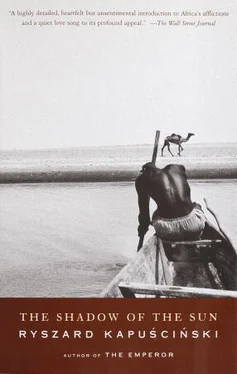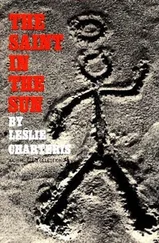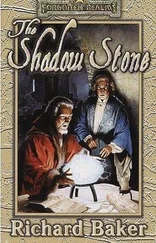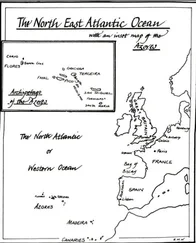We drove through an already sleeping Uganda, invisible behind the curtain of night. Somewhere nearby must have been Lake Victoria, somewhere the kingdoms of Ankole and Toro, the pastures of Mubende, Murchison Falls. All this surrounded by a night black as soot. A night full of silence. The car’s headlights pierced the darkness, and in their glow whirled a frenzied swarm of little flies, beetles, and mosquitoes, which appeared as if out of nowhere, for a fraction of a second played out before our eyes their role of a lifetime — the insect’s demonic dance — before perishing, splattered mercilessly upon the windshield of the speeding car.
Every now and then an oasis of light appeared in the undifferentiated blackness — a roadside shack lit up colorfully as though at a fair, glittering from afar: an Indian shop, a duka . Above the mounds of biscuits, tea bags, cigarettes, and matches, over the cans of sardines and the sticks of butter, we could make out, illuminated by a fluorescent lamp, the head of the proprietor, who sat motionless, waiting with patience and hope for late clients. The glow of these shops, which seemed to appear and disappear as if at our command, lit for us, like solitary lampposts on an empty street, the whole road to Kampala.
Kampala was readying for celebration. In several days, on October 9, Uganda was to receive its independence. The complicated deals and maneuvers continued up to the very last minute. Everything about the internal politics of Africa’s states is intricate and entangled. This stems directly from the fact that European colonialists, dividing Africa among themselves under Bismarck’s leadership during the Berlin conference, crammed the approximately ten thousand kingdoms, federations, and stateless but independent tribal associations that existed on this continent in the middle of the nineteenth century within the borders of barely forty colonies. Meantime, many of these kingdoms and tribal groups shared a long history of conflict and wars. And here, without being asked their opinion on the matter, they suddenly found themselves within one and the same colony, subject to the same (and foreign) authority, the same laws.
Now, with decolonization, the old interethnic relationships, which European rule only froze or simply ignored, suddenly sprang back to life and were becoming relevant again. The chance for liberty appeared, yes, but liberty with a proviso: that yesterday’s opponents and enemies form one nation and become its joint managers, patriots, and defenders. The former European colonial capitals and the leaders of Africa’s independence movements adopted the principle that if bloody internal conflicts erupted within a given colony, that territory would not become free.
The process of decolonization was to occur through what were stipulated as constitutional methods, at a round table, without great political dramas, ensuring the preservation of that which was most important: the uninterrupted flow of goods and riches between Africa and Europe.
The circumstances under which the leap to the kingdom of liberty was to be accomplished presented many Africans with a difficult choice. Colliding within them were two sets of considerations, two loyalties, in painful, almost insoluble conflict. On the one hand lay the deeply encoded remembrance of the history of one’s clan and people, of the allies one could turn to in times of need and of the enemies one had to despise, and on the other hand was the awareness that one was supposed to be entering the community of independent, modern societies, a precondition of which was the renunciation of all ethnic egoism and blindness.
It is this very problem that existed in Uganda. As defined by its current borders, it was a young country, barely several decades old. But its territory encompassed parts of four ancient kingdoms: Ankole, Buganda, Bunyoro, and Toro. The history of their mutual animosities and conflicts was as colorful and rich as anything between the Celts and the Saxons, or the Montagues and the Capulets.
Preeminent among them was the kingdom of Buganda, whose capital, Mengo, made up one of Kampala’s neighborhoods. Mengo is also the name of the hill upon which the royal palace stands. For Kampala, a city of extraordinary beauty, full of flowers, palm trees, mango trees, and poinsettia, is laid out across seven gentle green hills, several of which descend directly to the lake.
Once, royal palaces kept springing up on these hills, one by one: when a king died, his residence was abandoned and a new one was built on the next hilltop. The object was to not disturb that ongoing rule of the deceased, which continued, albeit from the other world. Thus the entire dynasty held power at once, with the actual living king as its guardian, its temporary representative.
In 1960, two years prior to liberation, people who did not consider themselves subject to the king of Buganda formed the UPC party (Uganda People’s Congress), which won the first elections. At its head stood a young civil servant, Milton Obote; I met him while he was still in Dar es Salaam.
The journalists who were expected in Kampala were to live in the barracks of an old hospital, situated slightly outside of town (the new one, a gift from Queen Elizabeth, was awaiting its dedication). We were the first to arrive; the barracks, white and clean, were still empty. In the main building, I was handed the room key. Leo was driving north to see Murchison Falls. I envied him, but had to stay behind to gather some material for my story. I found my building, which stood at some remove, on a slope amid luxuriant cinnamon and tamarind trees. The entrance to the room was at the end of a long corridor. I walked in, set down my bag and suitcase, closed the door. And at that moment I noticed that the bed, table, and chest of drawers were rising, and high up, beneath the ceiling, starting to whirl faster and faster.
I lost consciousness.
Inside the Mountain of Ice
When I opened my eyes, I saw a large white screen, and against its brightness the face of a black girl. Her eyes observed me for a moment, then vanished together with the rest of her face. A moment later the head of an Indian appeared on the screen. He must have leaned over me, for suddenly I saw him in close-up, as if magnified many times over.
“Thank God, you’re alive,” I heard. “But you’re sick. You have malaria. Cerebral malaria.”
I came to instantly. I wanted to sit up, but felt that I didn’t have the strength to, that I was paralyzed. Cerebral malaria is the terror of tropical Africa. Once, it was inevitably fatal. Even now it is dangerous, and frequently still deadly. Driving here, we passed near Arusha a cemetery of its victims, a vestige of the epidemic that had passed that way several years ago.
I tried to look around. The white screen above me was the ceiling of the room in which I was lying. I was in the just-opened Mulago Hospital, one of its first patients. The girl was a nurse called Dora, and the Indian was a doctor, Patel. They told me that an ambulance called by Leo had brought me here the day before. Leo had gone to the north, seen Murchison Falls, and three days later returned to Kampala. He walked into my room and saw me lying there unconscious. He ran to the reception desk for help, but it was Uganda’s independence day, the entire town was dancing, singing, swimming in beer and palm wine, and poor Leo didn’t know what to do. Finally he drove to the hospital himself and arranged for an ambulance. And that is how I found myself here, in a private room, in which everything still smelled of freshness, peace, and order.
The first signal of an imminent malaria attack is a feeling of anxiety, which comes on suddenly and for no clear reason. Something has happened to you, something bad. If you believe in spirits, you know what it is: someone has pronounced a curse, and an evil spirit has entered you, disabling you and rooting you to the ground. Hence the dullness, the weakness, the heaviness that comes over you. Everything is irritating. First and foremost, the light; you hate the light. And others are irritating — their loud voices, their revolting smell, their rough touch.
Читать дальше












